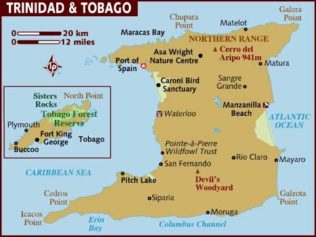The International Monetary Fund says Trinidad and Tobago is experiencing more robust growth after several years of “sub-par performance.”
After visiting the twin-island republic to conduct the country’s annual Article IV consultation, an IMF mission, led by Elie Canetti, projected that the economy will grow around 2.5 percent in 2014 after around 1.5 percent growth in 2013, “with the end of maintenance-related outages in the energy sector”.
Canetti said the non-energy sector was “fairly buoyant” in 2013, “which we anticipate will continue to be the case in 2014.”
He said the core inflation has been “relatively quiescent,” though it picked up to 2.7 percent in February 2014.
“The country’s external position remains healthy, with external reserves at US$10 billion, while the Heritage and Stabilization Fund’s assets continue to grow,” the mission said.
“Serious data deficiencies hinder a more complete assessment of balance of payments developments, but our best estimate is that the current account surplus should continue to be in double digits, as a percent of GDP (Gross Domestic Product) in 2014, thanks to a strong rebound in energy exports from 2013,” it added.
However, Canetti said there are signs that the growth of imports, notably automobiles, may be picking up.
On the capital account, he said there is anecdotal evidence that portfolio outflows are responding to interest rate differentials that have moved marginally in favor of investing in US dollar-denominated assets.
The IMF mission projects a fiscal deficit of about 1.5 percent of GDP in 2013-2014, closer to balance than envisaged in the budget statement.
However, it said this is due in part to “one-off developments,” without which the deficit would be closer to 3.5 percent of GDP.
Looking ahead, the mission said the case for expansionary fiscal policies to support the economy is waning amid signs that excess capacity, notably in the labor market, is rapidly being used up.
Thus, it said the smaller budget deficit is welcome, adding that there is a “strong case” to continue fiscal consolidation into the medium-term but based on policy changes that “durably improve” the structure of non-energy-based revenues and spending.
The IMF mission welcomed the government’s efforts to significantly reduce or eliminate arrears on energy subsidies, value-added tax (VAT) refunds and to suppliers.
“With excess liquidity in the banking system rising to TT$7.1 billion through March 2014, monetary policy will have to continue contending with a structural liquidity overhang for the foreseeable future.”
In addition, the mission said the time for withdrawing the accommodative monetary stance of the past few years may be coming nearer, “as the unemployment rate has fallen meaningfully, credit to consumers, and for real estate is growing at a relatively rapid pace, core inflation has risen, and interest rate differentials are shifting in favor of US interest rates.”
Read the full story at jamaicaobserver.com


